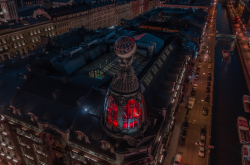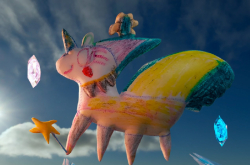Bars Arbat is an old resident of the Leningrad Zoo.He was brought here 19 years ago from Novosibirsk, still a kitten, and has been living in St. Petersburg since. As of now, he has a family with a female Kira, who was brought to the zoo nine years ago from Canada. Two years later, the couple had an offspring - kittens Sid and Ronda, who were transferred to other zoos upon growing up.
As of today, there are about two hundred snow leopards living in the world's zoos; their populace in the wild is tragically small. According to World Wildlife Fund (WWF), there are about 80-90 snow leopards in Russia, and no more than four thousand of them in the whole world.
Snow leopards, or ounces, live in the mountainous regions of Asia from Afghanistan to western China, in Tibet, Mongolia and Altai. Due to the inaccessibility of their habitats, snow leopards haven't been studied much; as of now, they are considered endangered species in all of the 12 countries of their habitat and are included in the IUCN Red List. Yet, even now the animals are threatened with extinction - poachers continue to hunt snow leopards, also, the decline in their natural prey takes its toll.
Feed the Bars - the new charity project by ITMO University's student sports club
Snow leopards rarely mate in captivity; in Russia, they regularly reproduce in the Moscow Zoo, and recently a pair had an offspring in a zoo in Perm. In the wild, snow leopards live up to 14 years, in captivity - up to 25. Thus, 19-year old Arbat can be considered a long-liver.
According to Dmitry Rusanov, Deputy Head of KronBars [Barses of Kronverk, bars is Russian for snow leopard -- Ed.], the idea to take charge of the animal was brought up two years ago. Previously, Herzen University did a similar thing - as pelican is its symbol, they took charge of a pair at the Leningrad Zoo. Yet, no University has ever taken charge of a rare predator.
"Snow leopard Tima is both our club's mascot and our university's sports brand that is known throughout the country. No sports club in Russia has ever taken the responsibility of helping a real animal, shares Dmitry. When we learned that there's a snow leopard living in the Leningrad Zoo, we've decided to take charge of it. In two years, the idea became a charity project. The Leningrad Zoo supported our initiative - since 1998, they have the Animal Care program. All funds raised are spent on the animal's upkeep."
 Bars Tim, ITMO's mascot
Bars Tim, ITMO's mascot
Arbat's upkeep is about 27.000 rubles a month - every day, he has to be fed with at least three kilograms of meat, all the other money goes on cleaning the cage, vitamins and medical care. The project's organizers plan to gather at least as much as that every month, so any donations are welcomed. One can send money via the project's official website. For every donation, there are branded gifts available," adds Dmitry Rusanov.
Are there any other ways one can help?
In future, the project's authors plan to further the idea. One would be able to "feed the bars" not only by donating money via the webpage, but by other ways as well - buying coffee, for instance. Evgenii Raskin, Head of the Youth Policy Office, notes that ITMO.STORE and the university's canteen are also ready to support the initiative.
"As for the canteen, we have ideas like spending 10% of the money that students pay for coffee for the Feed the Bars project. ITMO.STORE is also ready to support our initiatives, comments Evgenii Raskin. Yet, our main goal is more global: we want to draw attention to wildlife conservation problems. This is not only about animals, but protecting the environment in general. We believe that people have to know how much it costs, and that there are still many animals that need their support."






